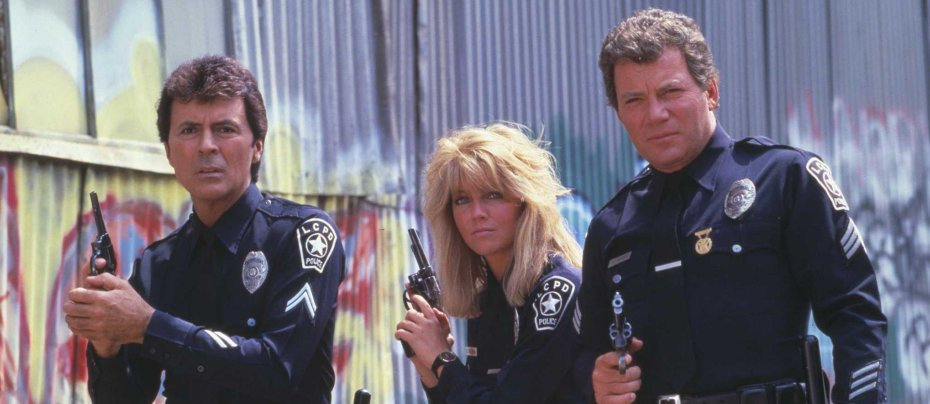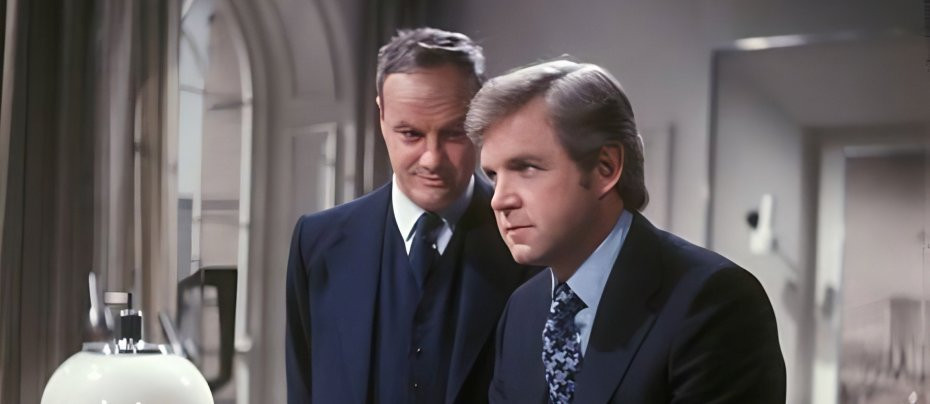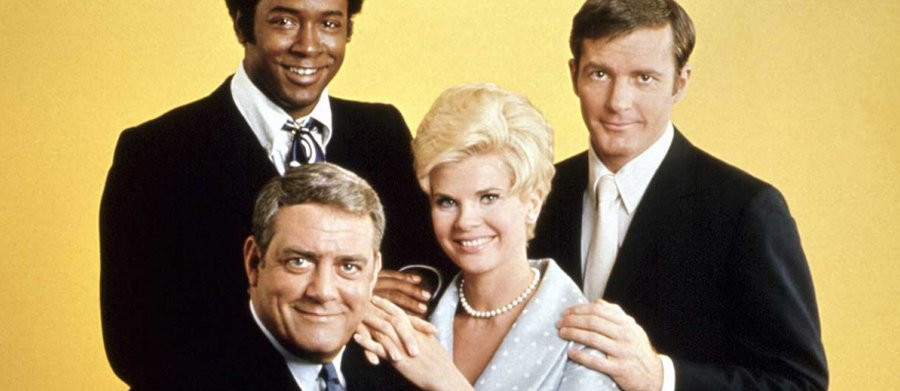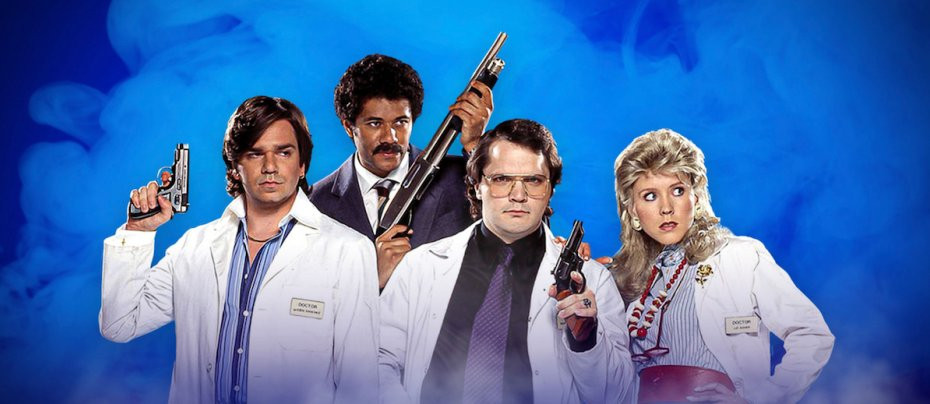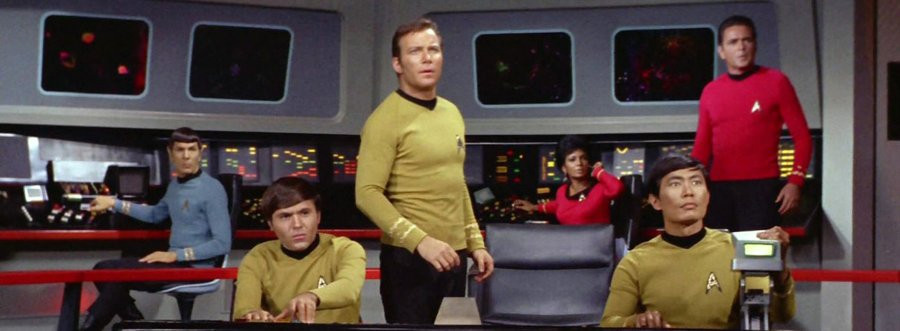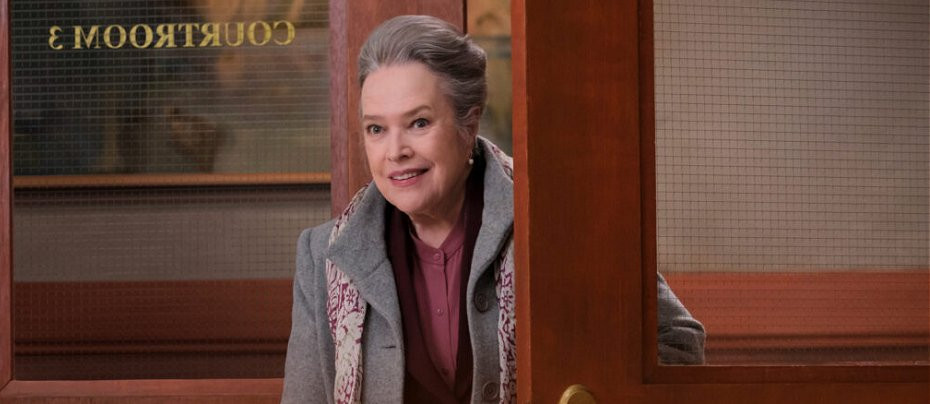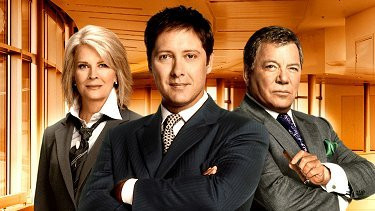
Boston Legal
2004 - United StatesDavid E. Kelley’s successor to The Practice was actually a hybrid, combining the serious cases and workplace conflicts of that series with the outrageous behaviour, unusual issues and a sometimes-adolescent attitude toward sex that distinguished Kelley’s controversial Ally McBeal. And while it sometimes went overboard, Boston Legal earned a devoted following due to a stellar star cast and Kelley’s progressive point of view (which may have been too liberal for conservative viewers who didn’t like seeing George W. Bush and Dick Cheney’s policies mocked every week).
Boston Legal was essentially a continuation of the final season of The Practice (see the review of that series for details), which introduced the characters of sexually obsessed and unconventional defence attorney Alan Shore (James Spader) and Denny Crane (William Shatner), the senior partner of prestigious Boston law firm Crane, Poole and Schmidt. Critics felt both Spader (and Shatner) revived The Practice in quality. No wonder ABC (which was suffering from a lack of hit series at the time) asked Kelley to create a new series built around Shore and Crane. The show’s initial title was Fleet Street (referring to the Boston address of Crane, Poole et al). But Kelley told “TV Guide” magazine ABC wanted a new name, noting Boston Legal was the suggestion that “seemed to make everybody the most happy.”
Premiering on October 4th, 2004, the core cast included Spader and Shatner, along with ‘Practice’ holdovers Lake Bell (as attorney Sally Heep) and Rhonda Mitra (as paralegal Tara Wilson). Mark Valley was also part of the cast as conservative former Marine and lady’s man Brad Chase, who was brought from Crane, Poole and Schmidt’s Washington D.C. office to oversee the increasingly erratic Denny Crane. Managing the operation was Paul Lewiston (Rene Auberjonois), who prided in stability and felt the extra-curricular antics of Crane and Shore were not in the firm’s best interest.
In early 2005, Candace Bergen (who made her television mark as Murphy Brown) joined the cast as Shirley Schmidt, the founding partner who returned to reverse a drop in litigation at the firm. (It was revealed Shirley and Denny had a romantic affair years earlier; Shirley moved on but Denny never did, always waiting for another chance to bed the aging but still attractive Schmidt.) Shirley also butted heads with the unconventional Alan, who also wanted to sleep with her.
Boston Legal carved a style and tone that was distinctly different from any other drama on broadcast television. Its quirky cases and the lawyers’ “politically incorrect” behaviour blended with serious discussions (and cases) regarding topical issues. Sex was a recurring theme; the mostly male cast was seemingly obsessed with it (both Alan and the aging Denny propositioned a number of women–and not subtly, either), while most of the women who passed through the law firm’s offices were either around for window dressing or were as predatory as their male counterparts. (Bergen’s Shirley Schmidt was the exception.)
Alan Shore, despite his quirky personality traits, was effective in defending his clients. His eloquent closing arguments to the jury combined the facts with black humour and his liberal political of view. Shore’s shots against the Bush administration and its policies certainly made for topical cases but didn’t make Boston Legal’s conservative viewers happy.
To balance things out, Denny Crane was a die-hard (but sometimes clownish) conservative, who espoused his views loudly and often. And there was no getting around the fact Boston Legal gave William Shatner his best television series role since Captain James T. Kirk on the original Star Trek. Denny was insensitive, selfish, and obsessed with sex despite his 70-plus years. But his increasing lack of focus, which was later diagnosed as early stages of Alzheimer’s, concerned Alan and others in the firm (Denny referred to his condition as “Mad Cow” disease; he claimed eating red meat was the cause.) Despite the outlandish things he did (and the things he said), Shatner managed to make Denny a sympathetic–and sometimes even loveable–figure.
Boston Legal was also not afraid to break television’s “fourth wall” and remind viewers that the show was fiction. Some of the asides had to do with the drama’s conventions; others were aimed at ABC’s treatment of the show–including its many time slot shifts. Despite following the very successful Desperate Housewives on Sunday nights in its first season, Boston Legal lost a fair chunk of the large audience it inherited. In early 2005, ABC replaced ‘Legal’ with the medical drama Grey’s Anatomy–which held on to a larger audience (averaging 17 million viewers versus 12.5 million for ‘Legal’). ABC renewed Boston Legal but moved the show to different nights (usually Tuesdays and Mondays) during its run. It was the most-watched series among young adult viewers (18 to 49 year olds) with annual incomes of over $100 thousand--reason enough for ABC to keep it on the air.
As the seasons passed, there were many comings and goings in the Boston Legal cast. After the first season, Rhona Mitra and Monica Potter departed; a new lawyer named Denise Bauer (Julie Bowen) was added. Several new junior associates also joined the show in the second season. By the third season, new attorneys Jeffrey Coho (Craig Bierko) and Claire Simms (Constance Zimmer) arrived (Coho left before the end of the season); Gary Anthony Williams joined the cast in mid-season as the cross-dressing legal eagle Clarence Bell.
Bigger changes took place during Season Four, as Rene Auberjonois and Mark Valley were dropped as regulars (both returned occasionally for future episodes); Bowen and Zimmer were also gone and never returned. John Larroquette (who had won an Emmy playing a different character on The Practice) was added as senior partner Carl Sack, whose job was to establish order at the law firm. He was joined by Saffron Burrows as English attorney Lorraine Weller and Taraji Henson as no-nonsense lawyer Whitney Rome. Actor Christian Clemenson, whose portrayal of bright but socially disabled lawyer Jerry Espenson (he suffered from Asperger syndrome) was seen starting in the second season, became a regular cast member with Season Four. For the shortened fifth season, Burrows left to join the cast of NBC’s short-lived drama My Own Worst Enemy while Williams and Henson also departed.
The final season found Crane, Poole & Schmidt in economic distress. The majority of the partners agreed to sell the legal firm to a Chinese syndicate but Shirley, Carl and Jerry joined three other partners to vote against the deal. To make matters worse, Denny insulted the new owners by shooting them with paint balls! The Chinese regime fought back, eliminating the firm’s litigation division and its staff (the show’s remaining characters). A last-minute plea by Alan shore led to an offer to rehire all the employees. (But due to Denny’s paint ball incident, he was removed as partner and the firm’s name was changed to Chang, Poole & Schmidt.) In other developments, Carl and Shirley (who fell in love) were ready to get married, while a doctor warned Denny his Alzheimer’s condition was getting worse, and quickly. In an effort to protect himself and his finances, Denny and his good buddy Alan decided to get married (same-sex weddings were legal in Massachusetts). Denny and Alan also headed to the U.S. Supreme Court for permission to use a non-approved drug on Denny that showed promise for Alzheimer’s. The series finale (which aired December 8th, 2008) showed a double wedding (Carl and Shirley, Denny and Alan) on the state’s Nimmo Bay–with Supreme Court Justice Antonin Scalia (played by actor Jack Shearer) presiding. It wasn’t a surprise: During the series’ run, Denny and Alan formed a strong friendship; they were seen sitting in overstuffed chairs on the 14th floor balcony of Denny’s office at the end of every episode, puffing away on cigars, enjoying a drink and hashing out the episode’s major plot developments–even making occasional plans for a “sleep over,” It was one of the most credible “bromances” between two men American television had to offer. For all its quirks–and it had many–Boston Legal also had heart, brains and an ability to laugh at itself. It was probably one of David E. Kelley’s best dramas because all his trademark elements were seamlessly blended into a series that stood out from the competition.
To quote Denny Crane: “Love us or hate us, there’s no place like us.”
Seen this show? How do you rate it?
Seen this show? How do you rate it?
Published on November 30th, 2018. Written by Mike Spadoni (2009) for Television Heaven.


